Crucial M550 Review: 128GB, 256GB, 512GB and 1TB Models Tested
by Kristian Vättö on March 18, 2014 8:00 AM ESTRandom Read/Write Speed
The four corners of SSD performance are as follows: random read, random write, sequential read and sequential write speed. Random accesses are generally small in size, while sequential accesses tend to be larger and thus we have the four Iometer tests we use in all of our reviews.
Our first test writes 4KB in a completely random pattern over an 8GB space of the drive to simulate the sort of random access that you'd see on an OS drive (even this is more stressful than a normal desktop user would see). We perform three concurrent IOs and run the test for 3 minutes. The results reported are in average MB/s over the entire time.
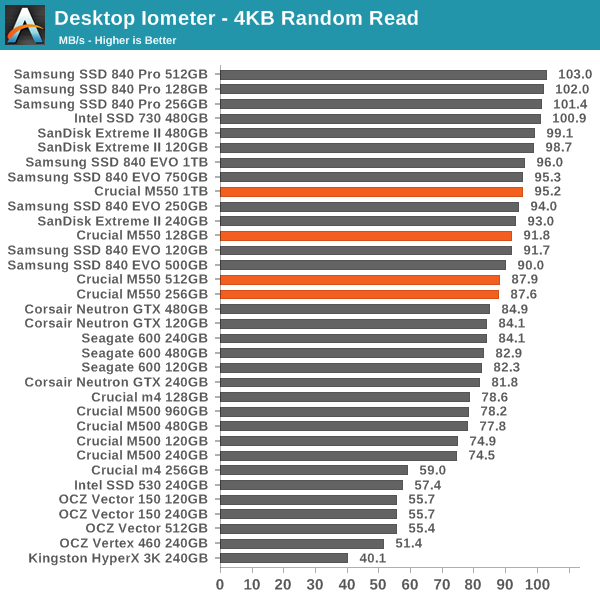
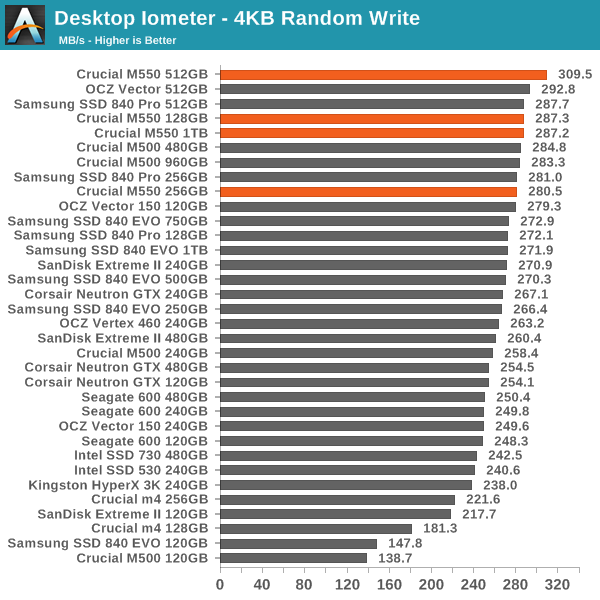
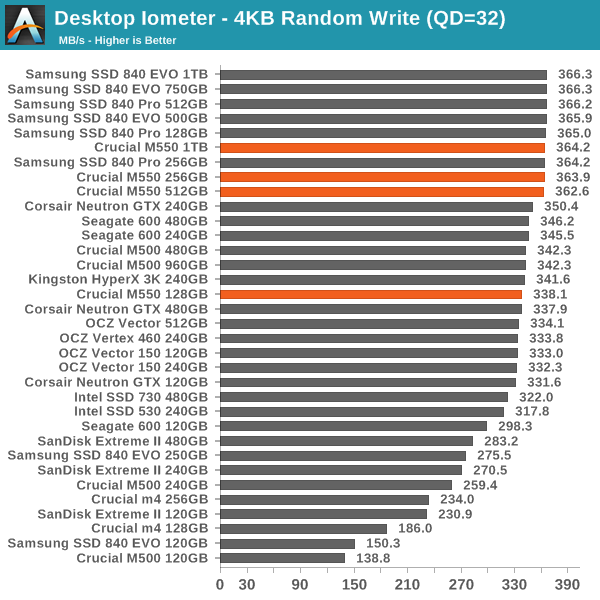
Random performance is strong when dealing with an empty drive but as the two previous pages show the big picture isn't as pleasant. The difference between 64Gbit and 128Gbit NAND is very clear here as the M550 is up to twice as fast as the M500 at the smaller capacities.
Sequential Read/Write Speed
To measure sequential performance I ran a 1 minute long 128KB sequential test over the entire span of the drive at a queue depth of 1. The results reported are in average MB/s over the entire test length.
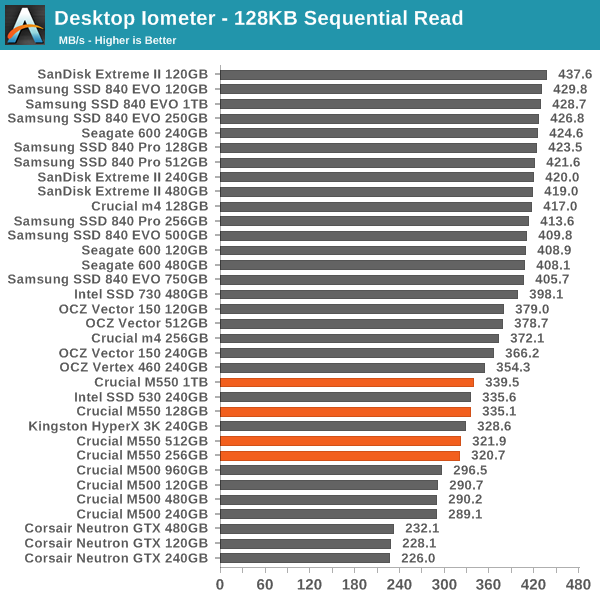
Sequential speeds are up quite a bit from the M500 as well but the read performance is still a bit lacking.
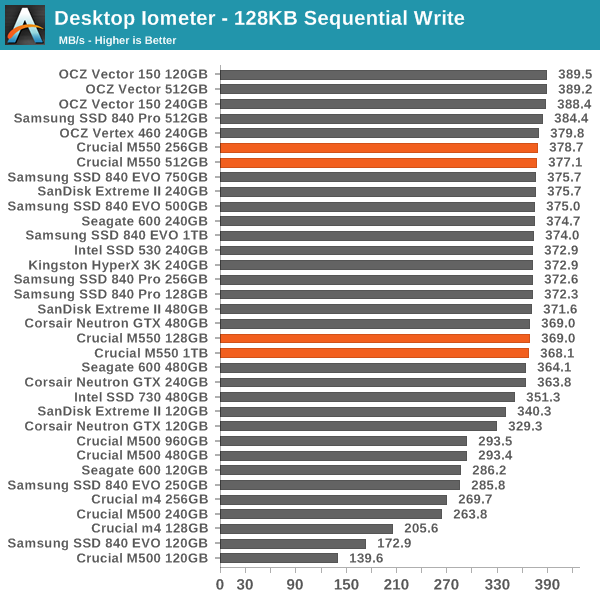
AS-SSD Incompressible Sequential Read/Write Performance
The AS-SSD sequential benchmark uses incompressible data for all of its transfers. The result is a pretty big reduction in sequential write speed on SandForce based controllers. Again, the M550 shows a decent improvement over the M500, particularly at the lower capacities.
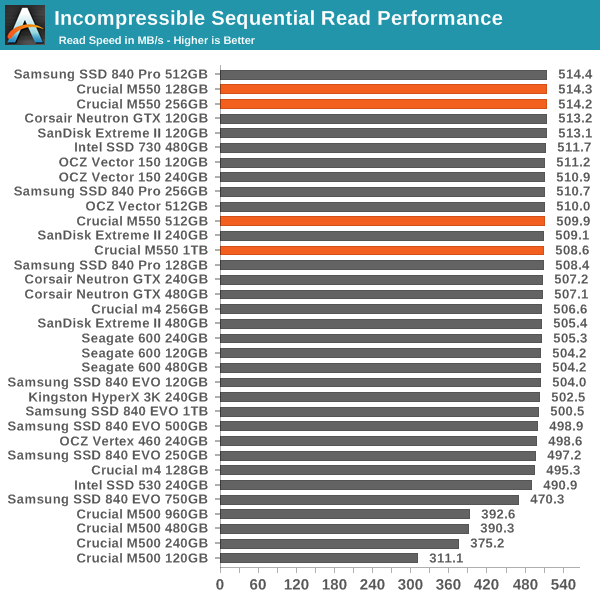
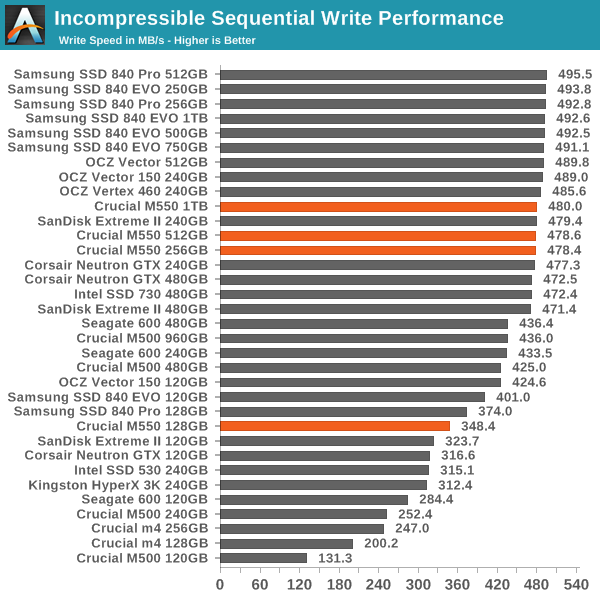










100 Comments
View All Comments
catavalon21 - Tuesday, March 18, 2014 - link
On the Amazon site if you look closely, the model # listed under the 512GB version is CT256M550SSD1; that's the 256GB drive. Maybe one more reason many of us use the Egg over Amazon...IMHO only...xrror - Wednesday, March 19, 2014 - link
regardless, the 512GB is now listed "Sign up to be notified when this item becomes available."and sorry, but Amazon is a very valid alternative to "the Egg" these days. Maybe if you're talking about the oldschool dot.com newegg of yore, but these days it's a good idea to shop around before defaulting to NewEgg.
Anyone rememember the ABS computer advertisements in Computer Shopper? Yea... old school newegg was unqualified awesome. Then sadly dot.com burst and well. At least the newegg that remains is a good company =)
catavalon21 - Wednesday, March 19, 2014 - link
Fair enough...and regarding Computer Shopper, wow, there was more than a little grief in those pages! One of my coworkers called one of the companies with good prices, snazzy ad, and swore he heard the baby crying and the significant other yelling at the guy who answered the phone. Guess I deserved the response, but still want folks hoping to get the great deal at Amazon to read carefully.hrbngr - Wednesday, March 19, 2014 - link
Kristian,I'm very happy w/the power loss data protection that this drive offers, as opposed to the Samsung 840 Evo, for example. Is there a more consistent, fast performer that offers similar data protection features that is also a decent value, in your opinion?
wiz329 - Wednesday, March 19, 2014 - link
Were the graphs made using Stata?beginner99 - Wednesday, March 19, 2014 - link
Isn't this review a bit harsh? I mean the old M500 is at leats where I live by far the cheapest ssd. Yes both the M500 and M550 don't look great in benchmarks but are there any real-life consumer scenario this will actually matter much? Especially the performance consistency seems pretty irrelevant for consumers. I'm not running a database server that is accessed like crazy. Actually my postgresql DB for development purposes runs on a WD green drive and thats just fine for that.btb - Wednesday, March 19, 2014 - link
Agreed. The M500 have been the (seemingly unrecognized?) brandname price/performance leader for a while now, especially for those of us that like ~1TB class SSDs. Unless one wanted a crappy TLC ssd there really was no alternative, and Anandtech gave it a very lukewarm review for some reason. From all accounts the M550 seems like a roughly ~10% improvement other the original M500, so as soon as the price drops down to M500 level, its a no-brainer buy compared to the current alternatives. I also see no reason to believe Anandtechs assesment that the M550 wont take over the M500's place as soon as Crucial have phased out their stock of M500's. Its just comon sense.Kristian Vättö - Wednesday, March 19, 2014 - link
It is not our assessment that the M550 won't replace the M500, it's a statement we got straight from Micron. I even double checked after the review went live to confirm that that is really the case.The reason we gave the EVO a good review is because it did well in our tests and was the cheapest drive at the time of its release. Why wouldn't we like it in that case? TLC NAND doesn't make it "crappy" - we've shown that the endurance of TLC NAND is more than enough for client usage several times and the EVO is in fact faster than the M500 even though it uses TLC NAND.
hojnikb - Wednesday, March 19, 2014 - link
Yeah samsungs "handpicked" TLC and MEX are really doing wonder indeed.btb - Thursday, March 20, 2014 - link
Fair enough, at the time of my purchase of 2 M500's last year, they were the only ~1TB SSDs that supported eDrive, so I did not look too closely at the EVO review. I have just glanced it over now, and I agree that it does appear to have nice specs. Although I am still skeptical about TLC, or at least you would think that if they can get that good performance from TLC, there should be plenty of room for improvement on the MLC side :)Anyway I wont be purchasing any more SSDs until they reach 2TB capacity, so seeing that Crucial just released a new generation and have yet to go past 1TB, I guess that could take a while. Perhaps Samsung with their TLC have a better chance of reaching the 2TB mark.
One area I do find Crucial slightly lagging in is on the software side. When I was running intel SSDs they had some decent software for reading the SMART attributes. And from the EVO review Samsung have some nice software as well. AFAIK Crucial dont have that, which seems like something they should correct.